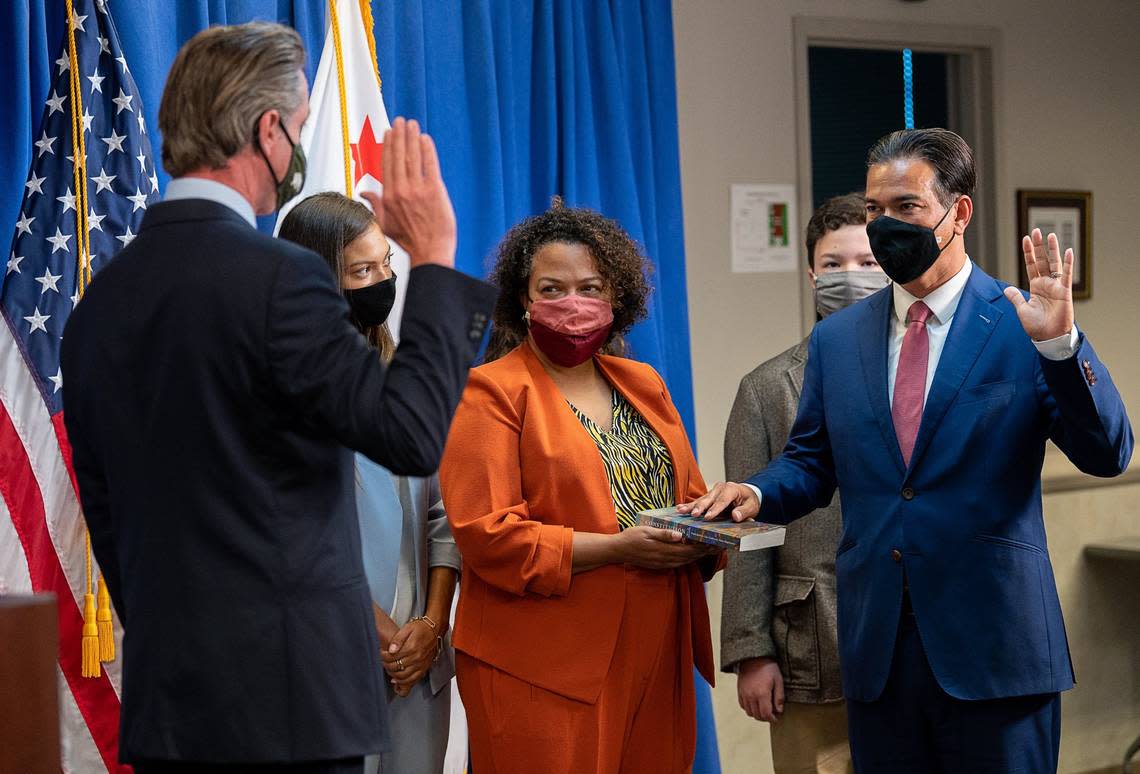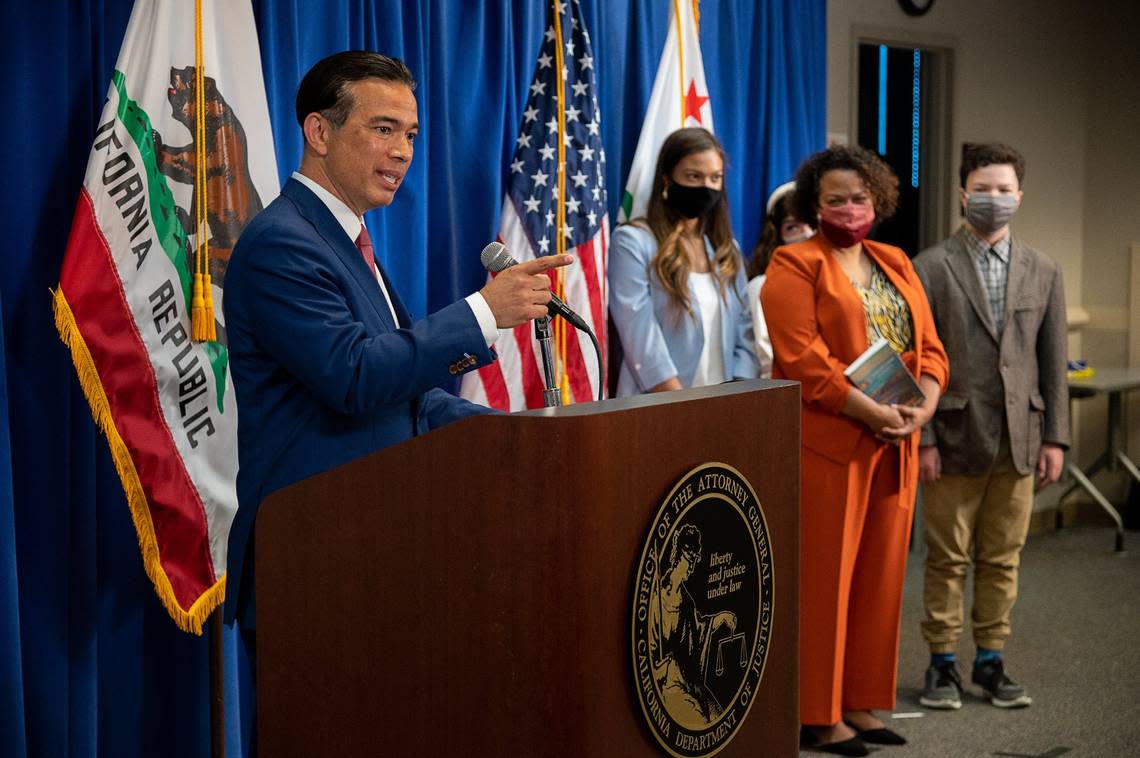Exclusive: Why is California’s Attorney General spending taxpayer money to send you emails?
Exactly two months before the state’s primary election, millions of California voters received an email with the subject line, “I want to hear from you.”
The April 7 message was from a government email account run by Rob Bonta, California’s attorney general who was facing his first statewide election after being appointed a year earlier when his predecessor vacated the post to join the Biden administration.
“As Attorney General, protecting California and its people is my highest priority,” read the message below Bonta’s smiling portrait. “As a California resident, your opinion truly matters to me.”
Bonta never urged anyone to vote for him and he never mentions the election is two months away. Instead, all Bonta asks is for the recipient of the email to fill out an online survey to let him know what “issues are most important to you.”
Newsletters — sent the following Fridays — would put Bonta’s name and face with a personalized message from him directly in the email accounts of as many as 9 million California voters, according to records obtained by The Sacramento Bee.
Bonta’s office said this week that the newsletters are merely a way to let the public know what his Department of Justice is doing to help Californians. But to others, the emails raise questions about whether politicians in charge of sprawling state agencies should be using their taxpayer-funded platforms to send personalized messages directly to the voters who’ll soon decide if they’ll keep their jobs.
Documents The Bee obtained through the California Public Records Act show that the newsletters were the result of Bonta’s office spending $204,700 in taxpayer funds to hire an IT firm to set up the software that emails the newsletter to voters. The Attorney General’s office obtained their emails from a voter registration database maintained by the California Secretary of State, the documents show.
Did Bonta’s emails violate election regulations?
It’s generally illegal for candidates to use taxpayer funds and a public agency’s staff for campaign purposes. But Bonta, who ended up placing first in the primary election, broke no laws by sending the emails out to voters. Experts said he’s in the clear because he never makes any reference to the fact that he’s up for reelection.
Still, using public resources to send a candidate’s message directly to voters right before an election is problematic, said John Pelissero, a senior scholar at the Markkula Center for Applied Ethics at Santa Clara University.
“There will be the perception on the part of voters that (the candidate is) doing something that doesn’t seem fair and that their opponents can’t tap into the funds of the State of California to promote their campaigns,” Pelissero said. “It will raise questions in some people’s minds about whether their activities have a campaign and election purpose more so than a good public-policy purpose behind them.”
Bonta’s office didn’t make him available for an interview, but in an emailed statement, his press office said Bonta “strongly believes that elected officials and state agencies should be responsive to the constituents they serve.”
“Attorney General Bonta is proud of (the Department of Justice’s) work to defend Californians’ rights and protect public safety,” the statement said. “And he is excited to share updates on that work with Californians on DOJ resources available to the public.”
To show that using voter registration data to send out newsletters is common, Bonta’s office sent The Bee copies of similar newsletters sent by State Sen. Richard Pan and Assemblyman Kevin McCarty, two Democrats from Sacramento.
Bonta’s opponents said it’s one thing for the offices of an assemblyman or a senator to send legislative updates to their constituents; it’s another matter for a state agency of more than 4,500 employees to spam voters’ emails on Bonta’s behalf.
They said the newsletters used taxpayer resources to give the incumbent an unfair advantage at a critical time when all of the candidates, including Bonta, were trying to pick up important name recognition and get their messages out to millions of Californians.
Rob Stutzman, a campaign consultant who worked for Sacramento County District Attorney Anne Marie Schubert in her failed bid to challenge Bonta in the primary, called for changes in state law.
“I think public officials should and can communicate to citizens,” Stutzman said. “But when the project is specifically focused on emailing registered voters, that seems like an update to the Political Reform Act would be appropriate.”
Bonta seeks ‘statewide contacts’
Gov. Gavin Newsom swore in Bonta, a state Assemblyman from Alameda, to replace Xavier Becerra in April 2021. Within weeks, Bonta directed his staff to begin sending out newsletters with his face and name on them.

The first went out in July, according to his press office, which shared two of the early newsletters with The Bee. It’s unclear what group of people received the newsletters, since Bonta’s office hadn’t yet received voter registration data from the Secretary of State.
The first newsletters weren’t written with a first-person greeting from Bonta like the ones that would come in the weeks before the election. Instead, the first volleys used “we” to announce the latest happenings inside the Department of Justice — the sort of public messaging typical at any large state agency.
“On Thursday, we released statewide 2020 gun sales data, which shows a record increase in the number of hand guns legally sold in the state and that the number of long guns sold last year was second only to 2016,” read a section of the newsletter that went out July 2, 2021.
Around that time, Bonta’s office was approaching the Secretary of State for voter registration data that would be used to dramatically expand the reach of the Attorney General’s Office.
“We’re promoting a new newsletter and seeking statewide contacts,” Allen Young, a member of Bonta’s press office, emailed the Secretary of State’s office on July 1, 2021. “I understand the California Assembly was able to obtain statewide contacts from VoteCal. We’d like to know if California Department of Justice is eligible to obtain the same list, and what steps would be involved in doing so.”
A few weeks later, Bonta’s office would pay $30 for a DVD containing the voter registration data. It would be substantially more expensive to actually send the newsletters to millions of people.
Records show Bonta’s office paid $204,700 to Solutions Simplified, a Sacramento IT firm, to set up the Granicus govDelivery Network software that would send out the newsletters to voters. “Expedite” is stamped on a “Purchase Requisition Form” from December.
The software company Granicus wrote in a memo that the firm was “ready to work as an extension of the California Attorney General’s Office,” which is “seeking to grow their subscriber base via a list of nine (9) million email addresses of Californian (sic) residents not currently subscribed to email updates.”
Bonta’s press office said the agency is currently sending the newsletters to 7 million people.
“Our previous internal system was not capable of sending a weekly email to a statewide constituency and created stress for DOJ’s internal servers,” Bonta’s press office told The Bee. “Additionally, our internal system did not provide us with metrics for deliverability, open or click rates. Therefore, we sought external help in delivering the weekly newsletter.”

Bonta’s press office said the newsletter email list is not filtered by any party affiliation. Instead, the emails are “delivered to Californians who opted in to receive more information from government officials and state agencies by providing optional email information when they registered to vote.”
A Bee reporter began receiving the emails to his personal account on April 7, starting with Bonta’s appeal to fill out the survey.
The newsletters with a first-person greeting at the top from Bonta started to arrive in the reporter’s email box on Fridays.
“From skyrocketing housing costs to the impact of housing discrimination, everywhere you look, California is facing a housing crisis of epic proportions,” Bonta wrote on April 15. “It’s going to take all of us, doing our part, to solve this crisis. I’m committed to doing mine.”
That month, The Bee filed a request under the California Public Records Act in an attempt to learn how, why and to whom the Attorney General’s Office was sending out messages in the months before the primary.
The Attorney General’s Office provided the records after The Bee’s attorneys threatened to sue.
Bonta’s office provided the records on June 17 — 10 days after the polls closed.
‘The oldest trick in politics’
The primary election ended up not being a particularly close race. Bonta coasted to an easy victory, earning 54% of the vote from a crowded field of candidates.
In November, he’ll face off in the general election against the second highest vote-getter, Republican Nathan Hochman, a former assistant U.S. Attorney. Hochman received 18% of the vote.
Bob Stern, one of the architects of California’s political ethics laws, said Bonta’s newsletters didn’t break the rules, since the first-person messages merely solicit feedback and tout the accomplishments of the Department of Justice under Bonta’s leadership.
That said, Stern said Bonta certainly used the platform to get his name and message out to millions of voters.
“I’m sure,” Stern said, “his opponent, Nathan Hochman, would love to do that.”
Hochman said it would have been one thing if Bonta had created a newsletter to communicate what the Department of Justice was doing without making the messages so Bonta-centric. Hochman said it was “completely unnecessary” for each of the newsletters to have Bonta’s photo plastered across the top.
“The fact,” Hochman said, “that he would be more focused on how to use taxpayer money to help his political campaign than using taxpayer money to prosecute crime, that’s par for the course for a politician — and not par for the course for a prosecutor.”
But not everyone is convinced Bonta’s newsletters crossed an ethical line.
Thad Kousser, a political scientist at UC San Diego, said it’s vital for an elected leader to connect with constituents and listen to what their priorities are.
He said elected officials always will closely read results of surveys similar to the one Bonta asked voters to fill out in his April “I want to hear from you” email.
“You better believe they were looking at what people said and using that to help dictate their priorities,” Kousser said. “That is part of how you create the electoral connection that ties politicians to people. That’s essential to democracy.”
Nonetheless, Kousser said using a public platform to tout an incumbent’s accomplishments is how politicians seek to gain an advantage over the competition. Kousser likened Bonta’s newsletters to how former President Donald Trump insisted on having his name signed on every stimulus check — Trump’s way of claiming credit for voters’ cash windfall.
“Using the prominence that your office gives to let voters know just how hard you’re working for them,” he said, “that’s the oldest trick in politics.”
The Bee’s Jason Pohl contributed to this story.
